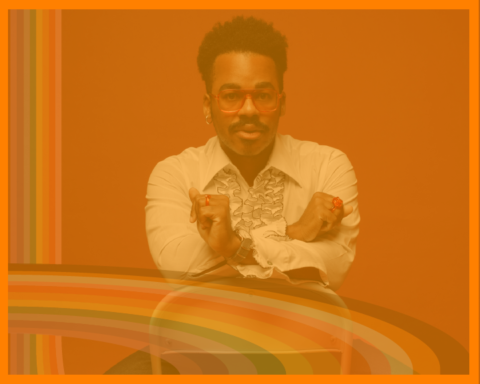Summer 2022

It can’t have been comfortable to be John the Baptist. Camel’s hair clothes and locusts aside, it’s never pleasant to be the one who tells people about a need to repent, to fundamentally change their lives. Perhaps it’s no surprise that we find John in the wilderness—that kind of confrontation can make someone unwelcome at dinner parties. But here we find him: Living the fullness of his truth, proclaiming it unashamed for anyone who might hear. And—as we begin this project of queering Mark’s gospel together—it’s a fitting text to begin with because, whew, what a queer experience. LGBTQIA+ people
More
Who is on the outside trying to get in? Isn’t interesting that no one turned and saw the man who couldn’t get and then pressed their siblings to make room, make a path and let him in. While this great crowd has gathered and pressed their way to hear, see and touch Jesus the person most in need of the love and healing touch of God was left on the outside. The church is to be an inclusive body, those on the outside, those on the margins, those in need of the love of the God as expressed throug
More
All my life, I have felt like an outcast. It’s a common story. As a child, I was small and often timid or awkward. I didn’t really fit in with the popular crew, the nerds, or the jocks. I couldn’t hit most things involving a ball and even though I loved musical theater, I could only score a spot in the chorus. I sort of floated around throughout the years, never really having a permanent circle. I grew up in an area outside Philadelphia that wasn’t quite city but also wasn’t fully suburbs either. I had a family that was
More
Mark’s Gospel uses concrete, sensory language to speak to the everyday needs of Jesus’s followers, and asserts that the kingdom of God is the here-and-now, not a lofty, disembodied hope that compels us to ignore our current realities. Mark portrays Jesus as a humble yet controversial rabbi who lived the fullness of the human experience; his salvific power exists because of his humanness, not in spite of it. By using parables, Jesus conveyed his teachings in language that is both accessible and enigmatic; readers still wrestle with these messages today, despite their deceptively simple language. The most fundamental question of
More
Among the many challenges of 2021 and 2022, anti-trans bills, proposed and passed, have soared across the United States. From the harshest in Alabama making gender affirming care for anyone under 19 a felony, to the many states that have passed laws prohibiting trans girls from playing sports with their gender peers, to the Texas governor declaring the support of trans youth “abuse,” the mission is abundantly clear. For the last 30 years, Adam Serwer wrote of the GOP last year, this has been a successful political strategy: “Find a misunderstood or marginalized group, convince voters that the members of
More
The opening scene in the sixth chapter of Mark is one that too many of us find familiar: Jesus, having left home to discover who he is, the call of God on his life, the literally miraculous fullness of his being, goes home. He returns to the synagogue. These are the friends, family, and neighbors who taught him to be a person. The ones that raised him up to love creation and the divine, to seek truth, holiness, and justice. But also the ones who always wished Jesus would be a little quieter, ask fewer questions, quit pushing so many
More
There is a term that has been able to transcend generations as a normalized colloquial term. I hear boomers like my mom, millennials like my friends, and zennials like my godchildren all using this familiar word. And although my generation, Gen X, coined the phrase, it has the innate ability to cross all barriers of age, race, religion, and socio-economic status in its legitimacy and accuracy. The term I am referring to is HATERS. Haters are those individuals who predicate their happiness on highlighting the flaws and fallacies of other individuals. Haters are not happy unless they are pointing out
More
Mark 8:22-26 is a passage that has lived with me for a very long time. In my deliverance years, I used these verses to comfort myself when I still felt ‘same-sex attracted’ after so many aching prayers. It takes time. I even preached a sermon one evening, when they had the up-and-coming ministers offer a word of exhortation. Healing is a process, I preached, you only have to trust the Jesus of Bethsaida.In this pericope, we encounter Jesus and the disciples, on a campaign of performing miracles. They arrive at Bethsaida, and following the usual trajectory, the townspeople bring to
More
English Spanish English Mark 9: 2-13 Six days later Jesus took Peter, James, and John, and brought them to the top of a very high mountain where they were alone. He was transformed in front of them, 3 and his clothes were amazingly bright, brighter than if they had been bleached white. 4 Elijah and Moses appeared and
More
I grew up in a fundamentalist evangelical church and we talked a lot about discipleship. We were to go out and make disciples of all people. We were to be good disciples. And what did a good disciple look like? A good disciple told lots of people about their faith and tried to get them to convert. A good disciple studied their Bible a lot and prayed a lot. A good disciple was active in their church; serving, giving money, and attending every Sunday. A good disciple attended a small group of some kind, had people they were accountable to.
More
Coming out. There are many reactions to this moment that are valid and sacred but the coming out moment is one that many queer folx share. Coming out is this moment of reckoning of who you are to yourself and to others. Coming out isn’t the pinnacle, the climax if you will, of the queer experience; it is the coming into oneself. It is naming, identifying who you are and claiming your own voice. Coming out is also about coming into your own voice. Throughout the gospels we see Jesus on his own journey of coming out and coming into
More
Chapter twelve of Mark’s gospel is rich with interlocking characters and critiques. In keeping with Mark’s earlier intercalations, the Gospel writer continues his method of multi-storytelling. That is, Mark’s interwoven, inter-related stories remain myriad, even as we near the cross and his Gospel’s end. In this piece, I interpret the widow’s offering (Mark 12:38-44) using the lens of performance art and LGBTQ experience. Although performance art is not solely a tool of LGBTQ liberation, it has been a well-known strategy for our community’s own meaning making and struggle for civil rights.
More
The end isn’t what it used to be: a portent of angels and demons or a cinematic Armageddon. Sitting on the Mount of Olives where he’d retreated before for solitude and prayer, Jesus responds to his disciples’ urgent questions. They ask “when.” They ask for signs. Ever the eager students, they want to know, “Will this be on the test?” And Jesus, like sunlight on a river, slips by their questions. He winds a path that evades the simple answers they crave. Today, Jesus’ response may read like a nightmare, or it may read like a newsfeed. With a nearly
More
Mark 14:22-26 is a story that Christians know well, the story of the Last Supper. This is Jesus’ final meal with His twelve apostles before He is to be betrayed, tried, and executed.
Jesus’ posture in this passage is somber and serious, as He administers the bread and wine to the confused and anxious twelve. After all, He had convened this final dinner to tell them the heartbreaking news, that in just a matter of hours, the radical movement they had started three years earlier; will come to a violent end at the hands of a brutal empire, an

Mark’s most horrific chapter opens with Jesus’ second interrogation. The anonymous Markan author tells of Jesus being given into the hands of Pilate who would’ve been historical Jesus’ most formidable opponent, although the author chose not to frame it according to this historical likelihood. What the author may have expressed with some accuracy is the curious but unsurprising transformation that follows. What began as a religious or spiritual charge of blasphemy against God from the Sanhedrin is conveniently metamorphosed into charges of treason against the throne - a necessary secularization that uncovers the historical reality that Jesus' true and most
More
There are two things happening with this final piece of Mark’s good news. First, we’ve got some revisionist history happening. Scholars agree that Mark was probably the very first of the gospels written. It’s the shortest and it’s missing some key pieces that the others have (the virgin birth isn’t there, Joseph never makes an appearance, and the story ends with Jesus in the tomb). There’s not really a resurrection story for Mark, at least not like the other gospels. Because this part, starting at verse 9, was added later to the original writing. Jesus was crucified and when Mary,
More

Unbound Social